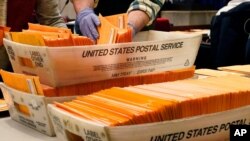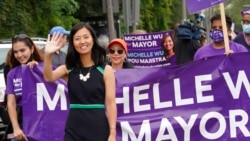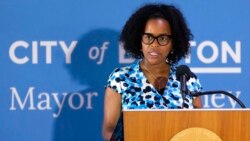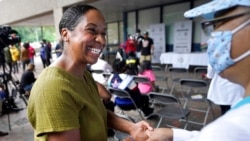The four front-runners in the race for mayor of Boston are all women of color, a remarkable turn of events for a city that has only elected white men to that office since its inception in 1822.
On Tuesday, voters will choose the top two candidates from a field of eight, but polling indicates that only four candidates stand a chance at advancing — each of whom is a woman of color. The two winners will face off in the official mayoral election on November 2.
Leading the field with 31% of the vote, according to Suffolk University polling released last week, is Michelle Wu, the first Asian-American woman to serve as a City Councilor. Locked in an extremely tight race for second place are Acting Mayor Kim Janey at 20%, City Councilor Annissa Essaibi George at 19%, and City Councilor Andrea Campbell at 18%.
Janey took office in March when former mayor Martin Walsh left to become U.S. secretary of labor. Janey and Campbell are both Black women. George is the daughter of a Tunisian-Arab father and a Polish mother, and identifies as a woman of color. There are four other candidates on the ballot, only three of whom remain active, but none was polling above 3% last week.
History will be made
"History will not be made on November 2, the day of the final election," said David Paleologos, director of the Suffolk University Political Research Center. "History will technically be made next Tuesday, because both candidates will be persons of color."
While in some ways remarkable, the candidates vying for mayor are actually a reflection of a city that has undergone significant change in its racial makeup over the past decades. Long a majority-white city, Boston is now a majority-minority city, with Black and Hispanic residents representing 19% of the population and Asians representing 11%. While still the largest single group, Whites now represent only 45% of the city's residents.
A signal of coming political change arrived in 2018 when Ayanna Pressley, a Black woman and a member of the City Council, unseated 10-term Congressman Mike Capuano as representative of Massachusetts' Seventh Congressional District.
Troubled racial history
Boston, the 24th-largest city in the U.S., has a complex and sometimes troubled racial history. In the years prior to the Civil War, the city was a hotbed of the Abolitionist movement, which demanded an end to slavery. And during the war, the famed all-Black 54th Massachusetts Infantry Regiment was raised there.
But the city hasn't always lived up to its history. In the 1970s and 1980s, efforts to integrate schools that were sharply divided by race were met with violent protests from White Bostonians who objected to having Black children bused into their neighborhoods for school.
One of the candidates, Acting Mayor Janey, experienced those riots as a child. At an event last week, she recalled being bused through rock-throwing mobs as a child. She said her presence as acting mayor and as a mayoral candidate are both "a testament to how far this city has come."
Candidates' biographies
Janey, who became acting mayor when Walsh joined the Biden administration, has already made history in that role as the first woman and first person of color to run City Hall. A native of Boston, she raised her daughter as a single mother in high school, and ultimately worked her way through Smith College.
Wu is a graduate of Harvard and Harvard Law School. She has served on the City Council since 2013 when, at age 28, she became the first Asian American elected to that body. The child of Taiwanese immigrants, Wu speaks fluent Mandarin and Spanish.
George is a native Bostonian who attended Boston University and earned a master's degree in Education from the University of Massachusetts Boston. A high school teacher since 2001, George was elected to the City Council in 2015.
Campbell, also a Boston native, has served on the City Council since 2015 and became the first Black woman to serve as Council president, a position she held for two years beginning in January 2018. She worked for a time as deputy legal counsel to Deval Patrick, the first Black person to serve as governor of Massachusetts.
Slow to elect women
The election of Pressley, and now the expected election of a woman of color as mayor, mark significant strides for a city that has not welcomed women to seats of power, said Erin O'Brien, an associate professor of Political Science and the University of Massachusetts Boston.
"Boston has been very slow to elect candidates of color, and women," she said. "And even today, we're barely middle of the pack when it comes to electing women, amongst the 50 states. So you've got a very liberal state, but you don't have a state where the elected leaders are as diverse as the populace."
One thing that won't be unique about the outcome of the election on Tuesday is the political party of the victor. All four of the leading candidates are members of the Democratic Party. Boston has not elected a Republican mayor since 1925.
Whoever prevails on Tuesday, said Suffolk's Paleologos, the result "is going to rewrite history, and in terms of the election, in November, of a person of color, that's a big story."








